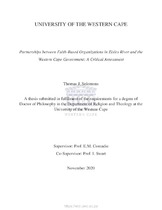| dc.description.abstract | With the National Development Plan vision 2030, the South African government has charted a path to ensure that through social development, poverty, inequality and unemployment will be eradicated in post-apartheid South Africa. After more than twenty years of democracy and freedom, the nature and scale of the problems plaguing social development are far from alleviated. However, scholars share the view that social development partnerships could enhance the delivery of developmental welfare services as is implied in the South Africa’s National Development Plan (NDP). The variety of actors involved in any functional partnership pose particular challenges, risks and benefits. In order to explore ways to assess the functionality of such partnerships, this study will focus on religion-state partnerships in social development, with special reference to FBOs, their relation with the state, society and the context within which they exist; hence, defining the nature, identity and role of FBOs in social development. | en_US |

